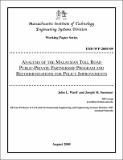| dc.contributor.author | Ward, John L. | |
| dc.contributor.author | Sussman, Joseph M. | |
| dc.date.accessioned | 2016-06-01T16:52:18Z | |
| dc.date.available | 2016-06-01T16:52:18Z | |
| dc.date.issued | 2005-08 | |
| dc.identifier.uri | http://hdl.handle.net/1721.1/102776 | |
| dc.description.abstract | Malaysia has relied on toll road public-private partnerships (PPPs) for over twenty years to provide important highway infrastructure. The program has been active with nearly 1800 kilometers either constructed or concessions agreed to. The public has been less supportive of the program due to low transparency and little public involvement. Public protests are common, which may lead to long-term program instability. The CLIOS Process, developed at MIT, is applied to Malaysia’s toll road PPP program to develop new policies that can better meet these public concerns while maintaining the financial viability of the sector. With increases in transparency and public involvement, the political risks of the program should be reduced and long-term stability for the government and concessionaires improved. We argue that the focus should be at the regional transportation planning level where toll road PPPs can be compared with alternatives for meeting transportation needs rather than at the national level where Malaysian toll road PPPs are currently handled. | en_US |
| dc.language.iso | en_US | en_US |
| dc.publisher | Massachusetts Institute of Technology. Engineering Systems Division | en_US |
| dc.relation.ispartofseries | ESD Working Papers;ESD-WP-2005-09 | |
| dc.title | Analysis of the Malaysian Toll Road Public-Private Partnership Program and Recommendations for Policy Improvements | en_US |
| dc.type | Working Paper | en_US |
